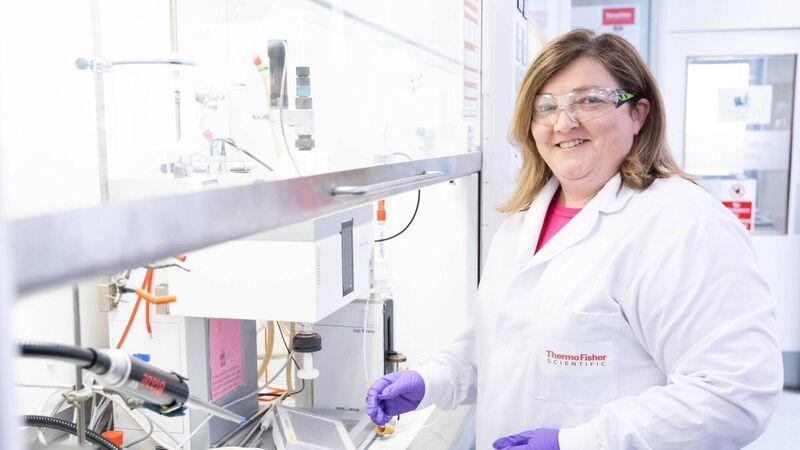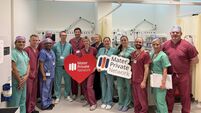My Career: Job has right chemistry

Norma Kelly Senior Process Chemistry Manager at Thermo Fisher Scientific, Cork. Picture: Darragh Kane
Name: Norma Kelly
Age: 47
Lives: Originally from Limerick, but living happily in Cork.
Job title: Senior Process Chemistry Manager at Thermo Fisher Scientific, Cork.
Salary bracket: My role at Thermo Fisher Scientific is rewarding both professionally and financially. I love my job and I consider myself incredibly lucky to have a job that I enjoy going to every morning, but also allows me to live a comfortable lifestyle outside of work.
Education background: I started off studying Applied Chemistry in Cork Institute of Technology, now Munster Technological University back in 1996. Following on from this, I went on to receive a Diploma in Chemical Technology in 1997. After this, I transferred to the University of Limerick to complete a Bachelor of Science in Industrial Chemistry.
Hobbies: Growing up, I played a lot of sports. I am a big sports fan, particularly GAA, both football and hurling, but if we are being honest, I definitely consider myself more of a spectator these days. Aside from that, I read and spend time socialising with my friends.
Describe your job in five words: Challenging, rewarding (definitely), ever-changing, enjoyable, impactful.
Describe yourself in five words: Optimistic, easy-going, honest, hard-working and fun.
Personality needed for this kind of work? You need to understand that sometimes things do not always work out as anticipated. Especially when working in chemistry, processes may not always go as planned, but you need to be able to step back, pick yourself up, and try again.
Being resilient and having a sense of humour helps, and while we take our job very seriously, we try to not take ourselves too seriously and have fun along the way.
How long are you doing this job? I have been working in my current role with Thermo Fisher for three years.
How did you get this job? I joined this Active Pharmaceutical Ingredient (API) development and manufacturing site straight from college in 2004 and can honestly say the time has flown. I have worked in a huge variety of roles and projects over the years and no two days are ever the same. I joined as a lab chemist in 2004 and then moved to a plant-based role as a process chemist. Over the years, I’ve worked on some amazing products, both clinical trial products and commercially available ones.
I still fondly remember the first process I worked on, which was used to treat the symptoms of Parkinson’s disease and restless legs syndrome, and the first API which I led the technical transfer of the chemistry into the site - it was used as an anti-cancer medication for advanced kidney cancer and other types of skin cancers.
I worked also in a central support function for external API manufacturers, which allowed me to indulge in my passion for travel during this time. While travelling for work doesn’t always mean you can do a lot of exploring, I did manage to book a few long weekends for some sightseeing.
In 2014, I moved into management and now led our very talented and capable process development chemistry team.
Do you need particular qualifications or experience? Having a scientific background or some form of third level education in the field of science would be an advantage, but people can learn on the job. In fact, it’s a very hands-on role and on-the-job, learning is something I would certainly encourage. I am very passionate about helping people progress and build their careers. I try to take advantage of additional learning opportunities while working with Thermo Fisher Scientific, and it’s something I try and encourage my team to do regularly.
Describe a day at work: I know it’s a cliché, but no two days are the same and that’s a genuine answer. Of course, there are tasks we carry out routinely in the Process Development Laboratories, but we’re present at the very beginning when the chemistry process is being developed to treat a disease, so things rarely go exactly as you initially plan them.
On a regular day, I generally begin by checking in with the team to see how projects they are working on are progressing and if there are any potential issues that we may need to find a solution for. Problem-solving is a big part of the job. Teamwork is another, we work closely with other teams on the site, including analysts, engineers and operators, as we scale up the chemistry processes used to manufacture medicines from small round bottom flask, 25ml in the laboratory to 1 litre, 20 litre and into 1,000s litre scale production on plant.
At Thermo Fisher, we work with multiple customers, from large pharmaceutical companies to niche biotechs, and we interact with our customers daily, keeping them in the loop as programmes progress and finding solutions when challenges arise.
As my team primarily works on early stage medicines for use in clinical trials, time lines are important as any delays can impact on the clinical trial programme and delay getting the medicine to patients.
Future strategic planning is also something I find myself doing quite often. We are expanding our Cork site, and part of my role is to consider what we will need going forward with respect to laboratories. This includes ensuring we have all of the necessary apparatus and equipment so we can deliver the very best to our clients, as well as ensuring we have the right team to do so.
Like I said, we are expanding at the moment and because of this I often find myself involved in the hiring process, whether that’s reviewing applications or carrying out interviews with prospective new hires and assisting with the on-boarding of new colleagues.
How many hours do you work a week? A typical working week at Thermo Fisher Scientific is generally 37.5 hours, finishing at 3.30pm on Friday. Of course, there are times we may have to work later in some cases, simply because working with new chemistry is unpredictable. Chemistry is never a nine-to-five job and because of this, we do have shift cover that we do for a limited period when working on a particular project.
What do you wear to work? For the most part, it’s pretty casual. Of course, there is the exception that if you are working in the laboratory or in the plant areas, we do have to wear certain protective PPE. This includes safety glasses and lab coats and safety shoes when in the laboratory. Likewise, if we are out on the manufacturing plant, we would wear our hard hats and covered sleeves, but in the offices and when coming and going from work, we can wear what we want.
Is your industry male or female dominated? This is an interesting question, because I feel like the perception is that it’s male-dominated but, in my experience, it has been more female-dominated. For most of my working career, my bosses have all been female. I can’t speak for other sites, but personally I would have to say on our site it’s clear that there has been a long history of women being promoted equally to men.
Does this affect you in any particular way? It’s inspiring. As I said, my first my boss was a female, and her boss was a female and throughout my career I have seen many women being promoted to managerial positions.
Being surrounded by all these incredibly talented women and seeing them getting the recognition they deserve is inspiring and motivating.
Is your job stressful? How? Rate it on a scale of 1-10: Yes, there are times it can be a bit stressful. For me personally, it’s about recognising when something is not working and developing a plan to overcome the challenge and persevering. It’s difficult to rate it because there can be so many ups and downs in science. When things get stressful and a solution has been identified to rectify the problem, there is an incredible sense of achievement and pride and that’s what keeps me going.
Do you work with others or on your own? One of the things I love about my job is that I get to work and collaborate with a diverse team, it takes a huge mix of skills to make a medicine, from analysts, chemists and engineers, to operators, crafts people and a host of support services like quality, IT, finance, HR, and operational excellence. It requires teamwork to safely and reliably make medicines.
When do you plan to retire or give up working? I have not thought that far down the line just yet. I thoroughly enjoy what I do and love the people I work with and what we do at Thermo Fisher Scientific. It’s a very rewarding job so I am happy to keep going for the time being.
Best bits: Definitely the people. I have an incredible team working with me and we have a great rapport. We’re all generally interested in achieving the same goal, but our personalities have differences too, which keeps things refreshing.
Worst bits: Keeping to the schedule. With any new development or new project, it’s a new science and things may not necessarily always go as planned.
It can be frustrating at times having to change plans or not being able to meet the schedule, but it’s the nature of the job. In this industry you have to be flexible and be willing to shift and adapt.
Advice to those who want your job? The main point I would like to stress to anyone looking for a career in the science industry is to come in and try to get some experience to see what it’s actually like. I was at a STEM conference recently and someone referred to the pharmaceutical industry like something from Charlie And The Chocolate Factory because people feel like they rarely get to see what happens inside a plant. However, there are lots of opportunities to get first-hand experience to see what goes on in the laboratory, for example we run a virtual Transition Year programme and take in several student interns every year from across the country.
If you are interested in things that are constantly changing and evolving, trouble-shooting, and solving puzzles, then a career in science is probably for you.
Any other comments? If chemistry isn’t for you, don’t let this stop you from pursuing a career in a pharmaceutical company. We have a whole array of departments that support us in doing what we do, from operations, crafts, engineering, safety, quality, validation, regulatory affairs, purchasing, planning, HR, and IT, to finance to name just a few. Be curious and see what appeals to you.
If you want to feature in My Career, email elaine.duggan@theecho.ie







 App?
App?




